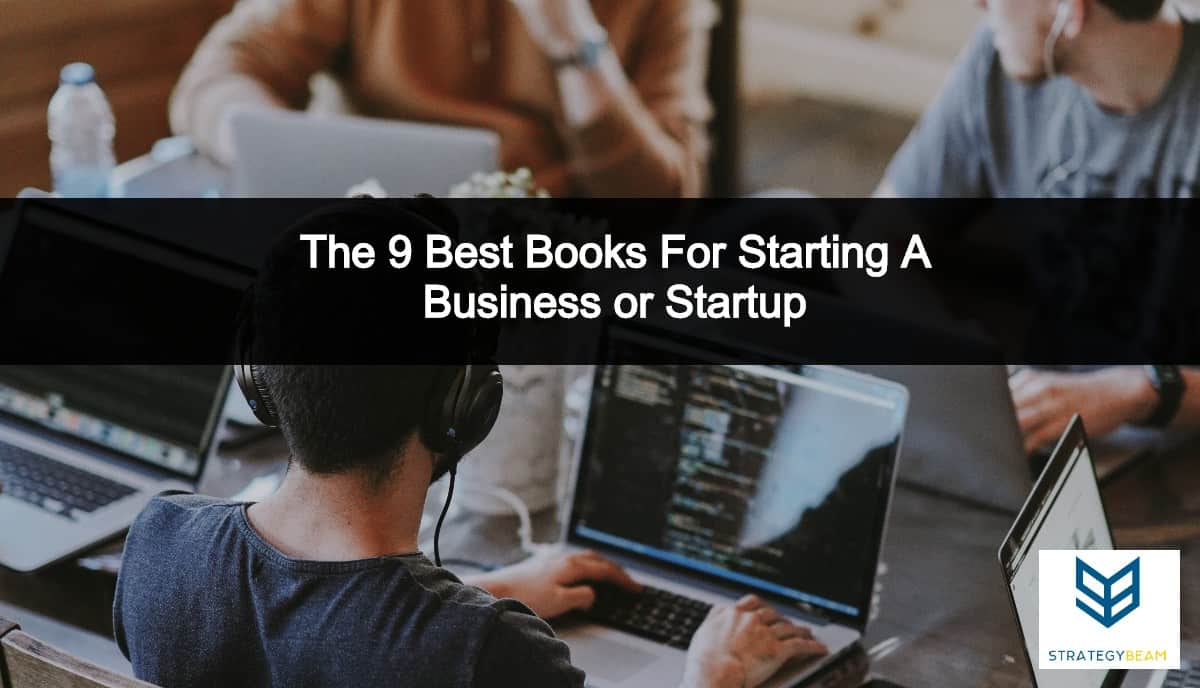
9 Of The Best Books On Starting A Business For Success
I do a lot of reading (177 titles and counting on Audible), and most of those titles are business and marketing. I want to share the best business books for startups, and just to be upfront this post has affiliate links in it and as an Amazon Associate I earn from qualifying purchases.
Starting a business is one of the most difficult things you can do in your life. Have you considered all of the variables that can lead you to sink a startup, and have you prepared yourself to launch a new business? Not only will you need funding, support, and the ability to adjust based on the market, you will also need to think like a marketer to get your product and solution in front of the right target audience.
For the past 8 years, I have worked with entrepreneurs and small business owners to make their dreams to reality as a mentor at StarterStudio. During this time, I have helped countless business owners launch startups and scale their operations into a successful business. Achieving profitability requires a focus on running a lean startup, using marketing tools like social media to grow your online presence, and constantly adjust to the market.
Each time I talk to an entrepreneur or small business owner, I try to think of ways to help them avoid the errors I experienced first-hand and errors from my peers. There are lots of business books bestsellers on the market, so I put together a list of the best books for starting a business to help you avoid grow today!
1. E-Myth Revisited
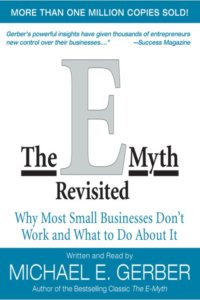
Quick Overview:
The E-Myth Revisited is one of the best books for starting a new business because it clearly outlines the pains of growing a startup from an entrepreneurial point of view. I think the best takeaway of this book about starting a business is that Gerber outlines the distinction between working on your business and working in your business.
The ultimate goal of starting a new business is to get the business to a point where it can run without you. Too many entrepreneurs get stuck in their business instead of working on their business. This business book sets the stage for setting up a system for business owners to keep their company running even if you are not directly working on specific projects.
Key Takeaways:
Many entrepreneurs start a business because they are knowledgeable about a specific set of their industry. Gerber outlines three different types of workers in a business:
- The Entrepreneur: Future-focused, strategy-driven visionary who builds systems for opportunities.
- The Manager: Results-focused worker who plans and organizes short-term plans.
- The Technician: A knowledgeable worker who focuses on the project at hand and is an expert in a specific production area.
If you are looking for a time-tested book for small business owners to start a new business, then you need to read this book to understand small businesses’ common flaws. The author uses a fictional small business starting up to set the stage on what your business launch and running could look like.
2. Lost & Founder
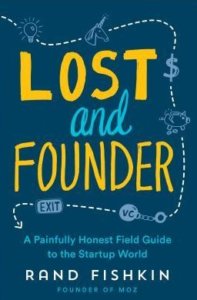
Quick Overview:
With a business startup, entrepreneurs often think about the rosy, optimistic view of running a business. This is especially true for first-time and new entrepreneurs need all the help they can get when starting a new business. Rand Fishkin is a famous entrepreneur who started Moz and several other tech startups, and he shows the hardships and lessons that he learned through the 15 years of running Moz.
A business school can’t teach you how to deal with common founder’s dilemmas, so this is a must-read book if you want to learn how to address common issues that you will experience when building a profitable business.
I loved the raw honesty and insight Rand provides, and the first few chapters of the book set the stage to tell readers that the typical path to starting a business is a false and dangerous mindset.
Rand shows what entrepreneurship looks like as he shares transparent financial, personal, and interpersonal interactions to outline the journey from initial idea to growing startup.
Key Takeaways:
While the book is not perfect, it offers a refreshing and truthful perspective about common issues that plague founders. These issues are often swept under the rug by entrepreneurs starting a business, but you can learn in-depth information about growing business like:
- The difference between service-based vs. product-based startup businesses.
- Why MVP is not the best idea for a SaaS business model.
- How a multi-product line can damage your brand in the marketplace.
- Everyone makes mistakes, and the results can be detrimental to your business.
If you are building a business, then you need to read this book about starting a business. It’s a rare opportunity to see how founders navigate difficult decisions and provide honest feedback on their past actions that hindered their business’s growth. You can use this book as a guide to start and grow your business!
3. How I Built This
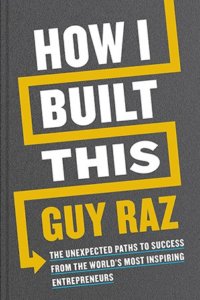
Quick Overview:
Guy Raz offers valuable advice from the world of business and top entrepreneurs on how to be a great leader when growing your startup. He uses descriptive and fresh examples of how people found inspiration and direction to share their passion through a small business.
Guy Raz uses high-profile examples in this amazing business book to show how entrepreneurship is lead by a positive mindset that can help you build a successful business.
He offers a variety of anecdotes and straight talk to show you how to generate big profits from past experiences of big companies, and even lesser-known businesses provide aspiring stories that will inspire you through your entrepreneurial adventures!
Key Takeaways:
You will notice similarities between the stories Guy Raz tells about entrepreneurship and The Hero’s Journey. Throughout his stories, you will see some interesting points like:
- Leave your safety zone to set out on your own hustle, but safely do this.
- Always iterate your thoughts and projects.
- Don’t try to break through the front door. Use the side door to find your niche.
- It would help if you built a strong culture to drive success.
- Be kind to yourself and your co-workers.
4. Will It Fly?
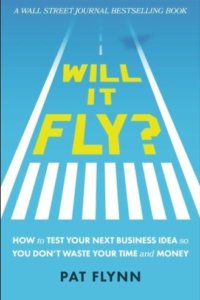
Quick Overview:
One of the hardest things about starting a business is that your idea could flop and cause you to fail your dreams. Instead of guessing, you can use a few tips to see if your business idea is running in the right direction.
This is one of the best books on starting a business because it combines action-based exercises and case studies that show the author’s personal experience to build and grow successful businesses.
Key Takeaways:
Will It Fly? Focuses on how to validate your business idea to set yourself up for success. Entrepreneurs are always working on new ideas to start a business, and you can use that excitement to make sure your business ideas are viable. The three main lessons that you will learn from this book are:
- How to create a business that fits your skills and goals.
- How to know what your customers are looking for and how they research solutions.
- How to pre-sell your product even before it is finalized.
If you’re looking for a great book on starting a business, then you can’t go wrong with Will It Fly? Because this book is action-packed and can help you validate your business idea early in the process. The best way to set off on the right foot is to talk to current/past clients about your product and service to understand how your business will perform in the market.
5. Pumpkin Plan
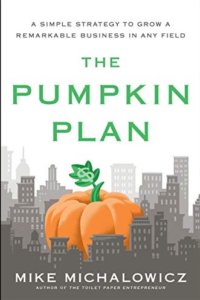
Quick Overview:
The Pumpkin Plan is an insightful book on how to start a business, and it can help entrepreneurs avoid frustration and failure. Instead of counting your business as one of the 80% of small businesses that fail each year, you can learn pro tips to avoid the grind and how to grow your business while you enjoy the fruits of your labor.
While most examples are nothing new, the author lays out ideas and stories in a new and refreshing way. You will find several steps to grow your business by working faster than your competitors, focusing on things that build value, and focusing your time on profitable clients.
Instead of growing many small pumpkins, you should focus on growing a few large pumpkins to ensure your success and happiness!
Key Takeaways:
This book for starting a business is filled with stories of successful entrepreneurs. Each part of The Pumpkin Plan will guide you through different strategies to build a successful and long-lasting business. Some of the best takeaways include:
- Don’t waste time or resources doing too many things.
- Identify specific things that you do better than other people and focus on that.
- Weed out the loser ideas so you can focus on the winners.
- Figure out what your customers value the most from your products and services and focus on those things.
- Find unfulfilled needs in the marketplace and build solutions that your customers will love.
You will learn how to streamline success by starting a business and shaping it around your customers’ needs. Don’t try to make the perfect solution from the beginning because you will need to adjust on the fly based on what your customers are looking for.
6. Launch
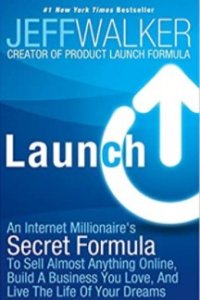
Quick Overview:
Launch is a book about starting a business fast. Even if you already own a business, you can use this book to learn how to create a successful position in the market. Along with several inspiring stories, this book will provide a blueprint that you can follow to start and grow your business.
Most entrepreneurs struggle to build products in their service-based consulting business. The good news is that the author provides the formula you can follow to build and scale your business!
Key Takeaways:
- Your email list is the most critical asset in your business.
- Use stories and mental triggers to increase sales.
- Make marketing an event that your customers will want to be part of.
- Build a sales letter with specific tactics to keep your customers engaged.
- Offer free content to get found and attract attention.
The launch is one of the most influential books that outline direct-response marketing strategies to grow your business. This book is more than your average book to build a business because it dives into specific ways to increase sales. Use this book to understand lessons that can help you in any industry and any market!
7. The Hard Things About Hard Things
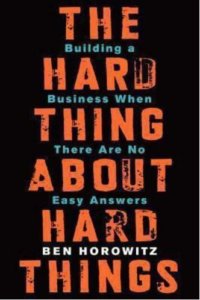
Quick Overview:
The Hard Thing About Hard Things is an inside look at starting a business from the ground up. The author, Ben Horowitz, offers honest advice on founding, funding, running, and managing a small business with a hands-on approach. Along with starting a business, The Hard Thing About Hard Things also covers buying, investing, and selling the business that you started so you can learn valuable experience advice no matter what stage your business is at.
Along with first-hand knowledge, this book also featured fresh anecdotes and stories from around Silicon Valley.
Key Takeaways:
You will love the storytelling approach to starting a business, but you will also enjoy some no-B.S. answers to some of the most challenging questions entrepreneurs have to ask, like:
- Is it OK to “poach” someone from your friend’s company?
- How do you take care of yourself as your employees rely on you?
- How should you handle promotions and titles in the early days of your business?
- How do you handle bad employees who are the smartest people at your business?
- How do you know when to sell your business?
8. The Goal
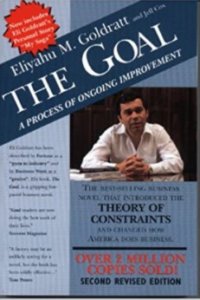
Quick Overview:
Eliyahu Goldratt offers a unique approach and perspective to start a business with The Goal. While reading, you will find that this book about starting a business is more than you’d expect—the approachable guide with detailed information about common issues you will experience when running your own business.
This is one of the best books for starting a business because Goldratt builds the story to show a simple message- that the slowest part of that system regulates the speed of a system. The book demonstrates this point in great detail and dives into different aspects of business theories by using an engaging story that you get invested in.
Key Takeaways:
I can’t recommend this book enough if you are starting your own business because it teaches you about the flow of work through organizations and if your business will be a success or failure.
- Know your goals: You will only track important metrics, and you need to determine your KPIs from the beginning to understand your business’s overall impact.
- Use common sense: Always question accepted principles because following the crowd when starting a business is illogical.
- Get your team to buy-in: If you want to make a significant impact, you need to get your team to buy into your plan and grow.
9. Smarter Faster Better
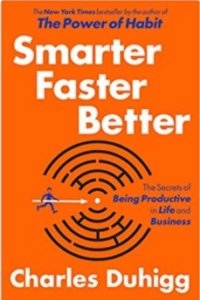
Quick Overview:
If you are looking to start your own business, you will need to improve your motivation. This is especially true if you are a manager or a team lead. Duhigg uses exciting ideas and stories to weave a compelling experience with proven business ideas and concepts to make sense for new business owners.
You will love the high-impact stories with real-world examples to illustrate abstract concepts you will need to work with when starting your own business. The book is well written, and you will love how the case studies and anecdotes build around a central theme in each chapter. It’s great to see that the stories and themes are completed by the end of each chapter, and the author does a great job leading each chapter into the next chapter that creates a deep tapestry to help you build a business from the ground up.
Key Takeaways:
- Establish your “why” and make small decisions: Motivation is usually the bottleneck of any business decision. If you want to get more done in a week, you will need to decide and then use small decisions to reach your goals.
- Create mental models: You can improve your chances of success by creating a mental model of different scenarios to prepare yourself for action when needed. This approach will help you be more productive and help you overcome obstacles when they arrive.
- Productivity is tied to creativity: Productivity does not require the best tools or strategies; instead, you will need to be creative when thinking through situations. Starting a business isn’t easy, but creativity will help you connect different ideas to find solutions when needed.
Disclosure: StrategyBeam.com participates in the Amazon Services LLC Associates Program, an affiliate advertising program designed to provide a means for publishers to earn fees by linking to Amazon.com and affiliated sites.



Will It Fly? is probably one of the best practical books. It’s especially good for people who are new to the game and want a step-by-step approach about starting a business. Recommend 100%. Thanks for the list.
great content, thanks for sharing
You’re welcome. Thank you for reading.